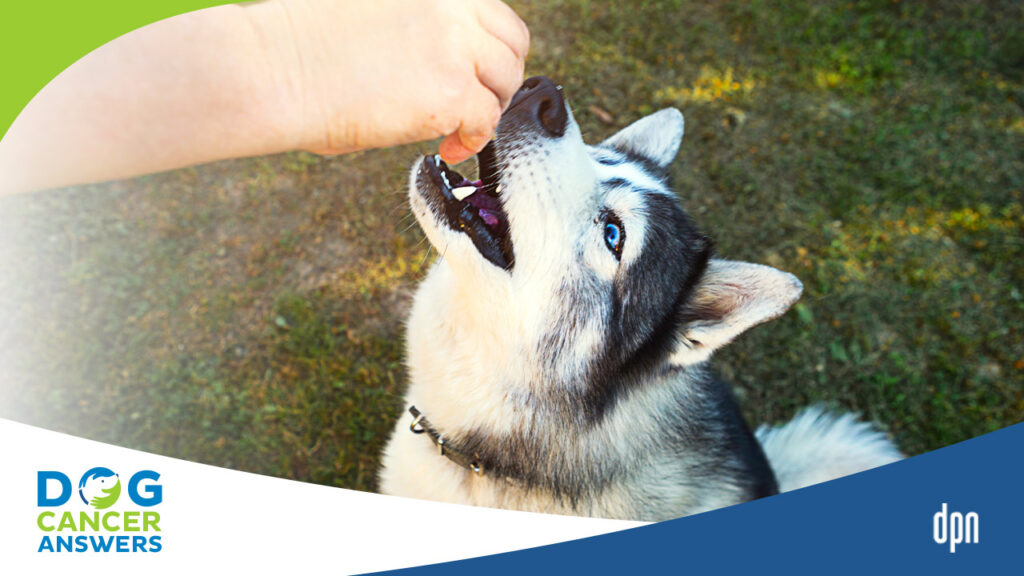Vitamin C is a well-known antioxidant naturally found in a variety of fruits and vegetables. Unlike humans, dogs can make vitamin C on their own and don’t require external sources of it to the same degree that we do. However, dogs who have cancer experience increased rates of physiological stress that use up vitamin C faster, so supplementing it into their diet can be helpful to support their immune system and overall health.
Key Takeaways
- You can give human vitamin C to your dog, but products intended for dogs may be absorbed better.
- You can give most vitamin C products to your dog, but sodium ascorbate may be the best.
- Vitamin C is good for sick dogs.
- You can add vitamin C to your dog’s diet by feeding foods rich in vitamin C like citrus, potatoes, broccoli, Brussels sprouts, cantaloupe, or strawberries.
Foods with Vitamin C for Dogs
Vitamin C is a water-soluble vitamin that’s naturally found in some foods, artificially added to others, and is also available in supplement form.1 Veterinarians don’t always recommend Vitamin C for dogs, with good reason.
Humans require outside sources of vitamin C because our bodies are unable to make it on our own.1 Dogs are another story – our canine companions can make vitamin C on their own by synthesizing it from glucose.2
When Vitamin C Might Be Useful for Dogs
However, dogs may be unable to synthesize vitamin C fast enough during times of stress or intensive exercise.2 Both stress and rigorous exercise are factors that can cause oxidative stress to cells in your dog’s body, so providing external sources of vitamin C is still important.
Vitamin C is naturally found in:1
- citrus fruits
- tomatoes
- potatoes
- peppers
- kiwi
- broccoli
- strawberries
- Brussels sprouts
- Cantaloupe
Vitamin C is also a nutrient that’s commonly added to foods such as grains used for breakfast cereals.1 Vitamin C supplements for humans are relatively popular.
Types of Vitamin C
It’s important to note that there are several types of vitamin C. These include calcium ascorbate, ascorbic acid, ester C, and sodium ascorbate.3
Ascorbic acid is what’s most commonly used in human vitamin C supplements,3 but dogs may absorb it as well as other more neutral types of vitamin C like calcium ascorbate, ester C, and sodium ascorbate.
Vitamin C supplements specifically formulated for dogs may be more beneficial for your dog than a product intended for humans.
Is Vitamin C Good for Dogs?
Vitamin C possesses a wide-ranging spectrum of health benefits for people and dogs. Let’s go over some of its benefits.
Collagen
For example, vitamin C is needed for the biosynthesis of collagen, which is an important component of connective tissue and wound healing.1
Antioxidant
Antioxidants work to neutralize free radicals, which can cause oxidative stress on cells in the body when they are present in high numbers. This oxidative stress can eventually lead to cancer, so limiting this damage can theoretically prevent or delay the development of certain cancers.1
For example, cigarettes contain a high number of free radicals, and doctors recommend 35 milligrams more of vitamin C a day for smokers than for non-smokers.1
Vitamin C itself is not only an antioxidant, but may help regenerate other antioxidants in the body, such as vitamin E.1 However, this theory may not clinically translate.
One study that sought to test the ability of vitamin C in the form of ascorbic acid to increase antioxidative and immunomodulating potential in 15 healthy dogs found that vitamin C had no appreciable impact on measured variables over the course of 36 days.2
Vitamin C also did not appear to impact the concentration of vitamin E in the dogs’ bodies.2 The study’s authors noted that dosing the schedule may have impacted some of the results observed, however the type of vitamin C used in the study is also one that is not well absorbed by dogs’ bodies to begin with.2
Vitamin C can also improve the body’s absorption of nonheme iron found in plants, which is an antioxidant.1
Vitamin C and Cancer
It’s thought that vitamin C and cancer are connected based on several lines of evidence. For instance, plasma concentrations of vitamin C are lower in people with cancer than those who are healthy. However, evidence is inconsistent as to whether one’s intake of vitamin C is connected to their cancer risk.1
Many case-control studies have found an inverse relationship between the amount of vitamin C consumed in one’s diet and the likelihood of developing lung, breast, colorectal, stomach, oral, and esophageal cancer.1 Alternatively, results from cohort studies are largely inconsistent, although this may be due to differences in the intake of vitamin C used among the studies investigated.1
The cancers that vitamin C may specifically benefit are not well known, but evidence of the ability of vitamin C to reduce the viability of melanoma and osteosarcoma cells suggests that vitamin C can at least assist in the prevention or treatment of those cancer types.4,5
A study that examined the effects of vitamin C, in the form of sodium ascorbate, on canine melanoma cells found that it reduced their viability over a period of two hours.4 The vitamin C caused apoptosis, or natural cell death, of the cancer cells.4
A similar outcome was observed when canine osteosarcoma cell lines were exposed to vitamin C.5 In addition, this study tested the side effects of intravenously administered vitamin C, in the form of ascorbic acid, on eight female Beagle dogs and found that high levels of vitamin C can safely be administered to dogs, although adverse symptoms were reported for two of the dogs participating in the study.5
Vitamin C is also used to treat mast cell tumors, because it can help to mediate and stabilize mast cells.11,13 This insight was in part inspired by the discovery of the link between histamine release in allergies, and how vitamin C could help break down histamine.12 More studies are needed, but many integrative veterinarians have started using vitamin C to support patients with mast cell tumors.
Common Uses of Vitamin C for Dogs
Lack of vitamin C can lead to several issues in humans, including scurvy, fatigue, joint pain, reduced would healing, hyperkeratosis, and bruising.1 Indirectly, a lack of vitamin C can result in anemia because it helps with the absorption of nonheme iron.1
Studies on canine melanoma and osteosarcoma cancer cells suggest that vitamin C might be helpful in treating these diseases.4,5
Anecdotally vitamin C is often touted as a panacea for urinary tract issues in dogs because it is acidic and can lower the pH of urine. While it may be somewhat beneficial in some cases, vitamin C should not be given to dogs with calcium oxalate crystals in the urine, as vitamin C supplementation can make this worse.10
Safety and Side Effects of Vitamin C for Dogs
Vitamin C has low levels of toxicity and is not believed to cause any serious adverse effects at high doses in humans or dogs.1,5 The most likely side effects are diarrhea, nausea, abdominal cramps, and general gastrointestinal discomfort.1
Recall that there are different types of vitamin C.3 These different types may have different side effects for your dog.
For example, calcium ascorbate and ester C have a neutral pH and are less likely to give your dog diarrhea or indigestion. Sodium ascorbate is touted as the best choice in terms of a vitamin C supplement for dogs because it is inexpensive, effective, and has relatively high bioavailability.6
Ascorbic acid is what’s found in most human vitamin C supplements, but this kind of vitamin C is not well absorbed in the body of dogs and can cause issues in their gastrointestinal tract.5
Because vitamin C supports the absorption of nonheme iron, too much vitamin C could theoretically lead to excess iron in the body, which is problematic for individuals with hereditary hemochromatosis, meaning that their body already easily absorbs iron.1
Remember, unlike us humans, your dog’s body can make vitamin C on its own, and there can be too much of a good thing. Any vitamin C that isn’t used by your dog’s body must go somewhere, and that’s in the form of oxalate in the urine.7 Too much oxalate can increase the risk for calcium oxalate stones or crystals to develop anywhere in the urinary tract from your dog’s kidneys down to their bladder.7,10
The oral Liposomal form of Vitamin C can decrease GI upset that Vitamin C can cause. It is thought to be absorbed better/quicker into cells.
Vitamin C Can Be Given With…
Vitamin C is generally thought to be safe and can be given along with most medications.
However, you should consult with your veterinarian prior to supplementing your dog’s daily routine with vitamin C just to make sure there are no potential interactions with your dog’s other meds.
When is Vitamin C Bad for Dogs?
In humans, vitamin C should not be given with medications that are phosphate binders.8 These are typically given in the treatment of kidney disease and can increase aluminum absorption.8
Other medication interactions can be from estrogens, protease inhibitors, and warfarin.8
Vitamin C should also not be used with niacin-simvastatin, commonly known as Zocor. Zocor is meant to lower lipid levels in the body, but the combination of Zocor with vitamin C may increase high-density lipoprotein levels.1
Vitamin C is an antioxidant, which may lower the efficacy of chemotherapy and radiation. Chemotherapy drugs, like cyclophosphamide, chlorambucil, and doxorubicin, as well as radiation, are meant to introduce a high number of free radicals to kill cancer cells.9 Antioxidants neutralize these free radicals, meaning that they could protect tumor cells from dying.
The true effect of antioxidants on conventional cancer treatments is somewhat controversial. It’s best to speak with your veterinarian about what they feel is an appropriate dose. Large doses of vitamin C have been observed to have a pro-oxidant effect on the body and may help boost your dog’s treatment.9
You’ll want to consult with your veterinary oncologist about adding vitamin C if your dog is currently receiving cancer treatment that involves chemotherapy or radiation.
Dosing Vitamin C for Dogs
If you are supplementing your dog’s diet with naturally occurring vitamin C found in fruits or vegetables, then you’ll want to give them to your dog fresh and uncooked. Just five servings of fruits and vegetables can pack more than 200 milligrams of vitamin C.1
Higher doses of vitamin C do not necessarily correlate with higher absorption. For example, absorption rates are 70% to 90% in humans regardless of whether the human body ingests 30 milligrams or 180 milligrams of vitamin C.1
Your pet’s size, health conditions, and age will determine how much vitamin C you should give them. Smaller dogs should get about 250 milligrams a day, medium dogs 500 milligrams, and large dogs 750 milligrams a day.6
Senior dogs will need more vitamin C than their younger counterparts.6
For dogs, vitamin C is typically given by mouth, but some intravenous delivery has been done in higher concentrations of 550 to 2,250 milligrams per kilogram of weight.5 These large doses may be extremely helpful for dogs with cancer.9
If giving a supplement at home, remember that Vitamin C is water soluble, so it is generally best given on an empty stomach, about an hour prior to food or 4 hours after a meal.
Vitamin C supplements can cause GI upset in some dogs, so you might need to give it with a little food if that’s the case for your dog. Follow your particular supplement’s labeled directions.
It’s best to consult with your veterinarian to determine if vitamin C is a good fit for your dog, and what the appropriate dose would be.
What If I Miss a Dose?
If you miss a vitamin C dose, simply skip it and then give your dog their next dose at the normal time.
Storage and Handling
The instructions on vitamin C supplements typically say to store them in a cool and dry place. Be sure to read the label on your particular product to make sure other measures are not needed.
Our Take on Vitamin C for Dogs
We humans put a big emphasis on vitamin C because our bodies can’t naturally make it. Dogs do not have this issue, but supplemental vitamin C can be extremely helpful when their bodies are under extra stress, such as when they have cancer.
However, vitamin C’s efficacy may be driven by the type of vitamin C, its dose, and its delivery method. You’ll want to check with your veterinarian to determine if adding vitamin C is appropriate for your dog.
- National Institutes of Health. Vitamin C. Dietary Supplement Fact Sheets. No publication date available. https://ods.od.nih.gov/factsheets/VitaminC-HealthProfessional/. Accessed on February 2, 2023.
- Hesta M, Ottermans C, Krammer-Lukas S, et al. The effect of vitamin C supplementation in healthy dogs on antioxidative capacity and immune parameters. J Anim Physiol Anim Nutr (Berl). 2009;93(1):26-34. doi:10.1111/j.1439-0396.2007.00774.x.
- Vitamin C Fact Sheet for Health Professionals. NIH Office of Dietary Supplements. https://ods.od.nih.gov/factsheets/VitaminC-HealthProfessional/#h3. Published March 26, 2021. Accessed April 17, 2023.
- Shin H, Nam A, Song KH, Lee K, Rebhun RB, Seo KW. Anticancer effects of high-dose ascorbate on canine melanoma cell lines. Vet Comp Oncol. 2018;16(4):616-621. doi:10.1111/vco.12429.
- Musser ML, Mahaffey AL, Fath MA, et al. In vitro Cytotoxicity and Pharmacokinetic Evaluation of Pharmacological Ascorbate in Dogs. Front Vet Sci. 2019;6:385. Published 2019 Nov 7. doi:10.3389/fvets.2019.00385
- Kerns N, Griswold B. Benefits of vitamin C to your dog. Whole Dog Journal. https://www.whole-dog-journal.com/food/benefits-of-vitamin-c-to-your-dog/. Published June 20, 2019. Accessed April 17, 2023.
- Linder DE. The A-B-C-’s of Vitamin C. Clinical Nutrition Service. April 28, 2018. https://vetnutrition.tufts.edu/2018/04/the-a-b-cs-of-vitamin-c/. Accessed February 3, 2023.
- Mayo Clinic Staff. Vitamin C. Mayo Clinic. November 17, 2020. https://www.mayoclinic.org/drugs-supplements-vitamin-c/art-20363932. Accessed February 3, 2023.
- Dressler D, Ettinger S. The Dog Cancer Survival Guide. Maui Media; 2011.
- Ograin V. Management of canine lower urinary tract disease Vicky L. Ograin, MBA … Illinois State Veterinary Medical Association. https://www.isvma.org/wp-content/uploads/2016/10/MANAGEMENTOFCANINELOWERURINARYTRACTDISEASE.pdf. Published 2016. Accessed April 17, 2023.
- Shaik-Dasthagirisheb YB, Conti P. Relationship between Vitamin C, Mast Cells and Inflammation. Longdom. https://www.longdom.org/open-access/relationship-between-vitamin-c-mast-cells-and-inflammation-35235.html. Published November 30, 2016. Accessed April 26, 2023.
- Maintz L, Novak N. Histamine and histamine intolerance. The American Journal of Clinical Nutrition. https://www.sciencedirect.com/science/article/pii/S0002916523280533. Published May 1, 2007. Accessed April 26, 2023.
- Kazama I, Sato Y, Tamada T. Pyridoxine synergistically potentiates mast cell-stabilizing property of ascorbic acid. Cellular physiology and biochemistry : international journal of experimental cellular physiology, biochemistry, and pharmacology. https://pubmed.ncbi.nlm.nih.gov/35781358/. Published June 30, 2022. Accessed April 26, 2023.
Topics
Did You Find This Helpful? Share It with Your Pack!
Use the buttons to share what you learned on social media, download a PDF, print this out, or email it to your veterinarian.






